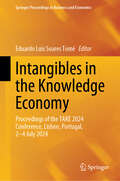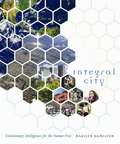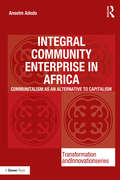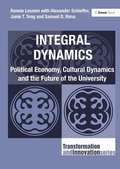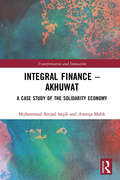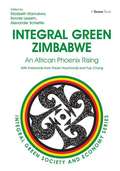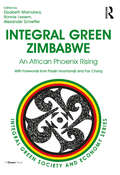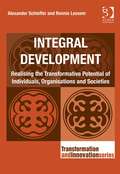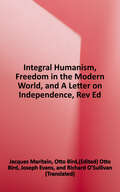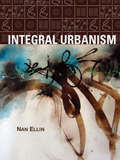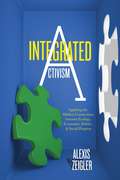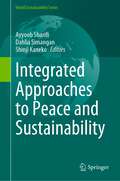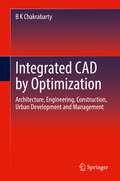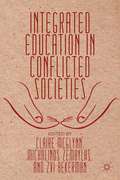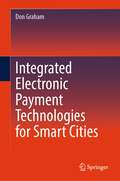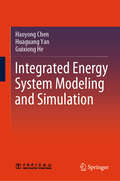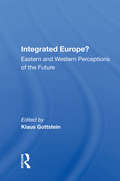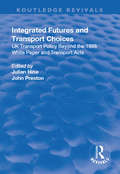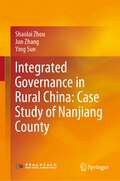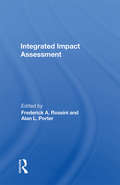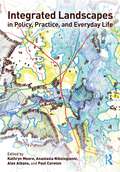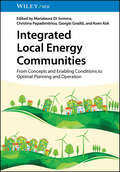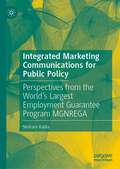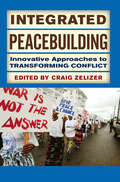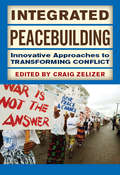- Table View
- List View
Intangibles in the Knowledge Economy: Proceedings of the TAKE 2024 Conference, Lisbon, Portugal, 2–4 July 2024 (Springer Proceedings in Business and Economics)
by Eduardo Luis Soares ToméThis book features selected chapters from the proceedings of the Multidisciplinary Conference on Intangibles (TAKE), held in Lisbon, Portugal, in July 2024. The chapters cover a wide range of topics , including human resource development, intellectual capital, knowledge management, logistics, retailing, public policy, innovation and entrepreneurship, business models, competitiveness, and accounting. The book is a valuable resource for researchers, practitioners, and industry experts interested in shaping the future of the knowledge economy.
Integral City: Evolutionary Intelligences for the Human Hive
by Marilyn HamiltonThe original inspiration for this book must come from my father, Jack Douglas Herbert, one of Canada's seminal museum developers. When I was eight, he told me to write about what I know (and of course, now I know my pursuit of knowing is a never-ending quest).
Integral Community Enterprise in Africa: Communitalism as an Alternative to Capitalism (Transformation and Innovation)
by Anselm AdodoAt a time of global economic crisis and disillusionment with capitalism, Adodo offers refreshing and positive insight into a more integral way of business management, enterprise and community development as well as holistic healing in Africa. For over three decades, Africa was the recipient of billions of dollars in aid funds that were meant to catapult the continent from undeveloped to developed status. Yet the more the aid poured in, the poorer African countries became. The devastating effect of western economic models in Africa that followed is well documented. Integral Community Enterprise in Africa exposes the limitations of existing theories, such as capitalism, socialism and communism, and shows how western theories were imposed on Africa. Such imposition of concepts and ideas is not only demeaning but also unsustainable, serving only the interest of the elite. Father Anselm Adodo argues for the need to have a southern theory to serve as an alternative to western theories. The majority of African intellectuals and activists, while criticizing existing theories, often do not provide alternative theories to address the prevalent inadequacies entrenched in conventional social, political and economic systems. This revolutionary book aims to address this lapse and proposes the theory of communitalism as a more indigenous, sustainable and integral approach to tackling the social, political, economic and developmental challenges of today’s Africa. There is an African alternative to capitalism, socialism and communism – a surer path to sustainable development in and from Africa. This is a book that is positioned at the very core of a much needed African Renaissance. A profoundly new approach to development in Africa, this is essential reading for anyone concerned with authentic development in Africa and in the world.
Integral Dynamics: Political Economy, Cultural Dynamics and the Future of the University
by Ronnie Lessem Alexander Schieffer Junie T. Tong Samuel D. RimaThe theory of integral dynamics is based on the view that the development of individual leaders or entrepreneurs requires the simultaneous development of institutions and societies. It seeks a specific way forward for each society, fundamentally different from, but drawing on, its past. Nearly every natural science has been transformed from an analytically-based approach to a dynamic one: now it is time for society and culture to follow suit locally and globally. Each culture, discipline and person is incomplete and is in need of others in order to develop and evolve.
Integral Finance – Akhuwat: A Case Study of the Solidarity Economy (Transformation and Innovation)
by Muhammad Amjad Saqib Aneeqa MalikThere are many misconceptions and concerns regarding Islamic societies and how Muslim countries have failed to come up with their own localised solutions to socio-economic problems in dealing with poverty alleviation and societal development. This book explores why there is so much disconnect between spirituality and enterprise development in the world today, and how a part of the Islamic world, in fact located in Pakistan, can be part of the solution rather than being central to the problem. This book builds upon Ronnie Lessem and Alexander Schieffer’s theory of ‘integral dynamics’ which works through a fourfold rhythm of the GENE. Set against a mono-cultural perspective, the authors highlight the ever-increasing and deepening divide between Western and Islamic cultures. Through the course of the book, the authors use the transformational GENE (Grounding, Emergence, Navigation, Effect) rhythm developed by Lessem and Schieffer to take readers through the 4C (Call, Context, Co-creation and Contribution) process, articulated to CAREing-4-Society. They ground their call in Akhuwat’s community of Akhuwateers (donors, beneficiaries, borrowers, volunteers and replicators), to explore alternative models of spiritually based finance through an emerging SOUL-idarity paradigm. Furthermore, through these models and Akhuwat’s CARE (Community, Awareness, Research, Embodiment) process, they put forward that encouraging community activism, raising awareness around Islamic practices of Qard-e-Hasan, institutionalising their innovative research, and finally transforming and educating the community, will provide an alternative to microfinance for poverty alleviation. Showcasing an unconventional spiritual-financial solution, deeply immersed in spirituality and infused with local moral values and traditions, this book demonstrates how poverty can be alleviated in countries around the world, specifically, in developing Muslim countries.
Integral Green Zimbabwe: An African Phoenix Rising (Integral Green Society And Economy Series #1)
by Ronnie Lessem Alexander Schieffer Elizabeth MamukwaIntegral Green Zimbabwe: An African Phoenix marks the debut of the Integral Green Society and Economy series, which links the philosophical 'integral' age with the practical 'green' movement. <P><P>The series blends elements of nature and community, culture and spirituality, science and technology, politics and economics--while this particular volume focuses specifically on Zimbabwe, as well as Southern Africa, drawing on the particular issues and capacities that this country and region represent.
Integral Green Zimbabwe: An African Phoenix Rising (Integral Green Society And Economy Series #1)
by Ronnie Lessem Alexander Schieffer Elizabeth MamukwaIntegral Green Zimbabwe: An African Phoenix Rising by Ronnie Lessem, Alexander Schieffer and Liz Mamukwa is the first book in the Integral Green Society and Economy series, a series which has three overarching aims. The first aim is to link together two major movements of our time, one philosophical, the other practical. The philosophical movement is towards what many today are calling an 'integral' age, while the practical is the 'green' movement, duly aligned with that of sustainable development. The second is to blend together elements of nature and community, culture and spirituality, science and technology, politics and economics, thus serving to bring about an 'integral green' vision, albeit with a focus on business and economics. As such, the authors transcend the limitations to sustainable development and environmental economics, which are overly ecological, if not also technological, in orientation, and exclude social and cultural elements. Thirdly, this particular volume focuses specifically on Zimbabwe, as well as Southern Africa, drawing on the particular issues and capacities that this country and region represents. The emphasis on Zimbabwe and Southern Africa transpired not only because two of the editors (Lessem and Mamukwa) are Zimbabwean in origin, but because Zimbabwe is today like a phoenix rising from the ashes, and has the opportunity to recreate itself anew.
Integral Human Development: Self, Enterprise, and Society
by Ronnie Lessem Alecander SchiefferSchieffer and Lessem introduce a groundbreaking development framework and process to address the most burning issues that humanity faces. While conventional top-down, outside-in development has reached a cul-de-sac, a new, integral form of development is emerging around the world. Integral Development uniquely articulates this emergent approach, and invites us to fully participate in this process. Integral Development combines four mutually reinforcing perspectives: nature and community; culture and spirituality; science, systems and technology; and enterprise and economics. Conventional development theory and practice has prioritized the latter two perspectives, neglecting the former two. This has caused massive imbalances in today's world. Integral Development shows how individual, organizational and societal developments need to be interconnected to overcome these imbalances and to release a society's full potential. It shifts the responsibility for large-scale development from often-distant development experts and organizations to each individual, community, enterprise and institution within the society.
Integral Humanism: Freedom in the Modern World, and a Letter on Independence
by Jacques MaritainThe three books presented in this volume, Integral Humanism, Freedom in the Modern World, and A Letter on Independence, were all written in the early 1930s, a time of dire trouble for France. France was then surrounded by enemies preparing for war and was itself so violently split between parties of Left and Right that it seemed on the verge of civil war. In this collection, Jacques Maritain accepts the responsibility of a Christian philosopher to actively address the agonizing practical problems of the time. Maritain discusses major political issues such as the relation of freedom and religion, the opposition of democracy to any form of totalitarianism, the relation of the spiritual and the temporal, the need for an integral and Christian humanism, and the prospects for a new Christian civilization, all in opposition to the materialism of both communism and capitalism. Against the fierce antagonism of the parties of the political Left and Right, Maritain declares a plague on both their houses and strongly affirms the need for independence from both of them. He does so by distinguishing between two senses of the terms Left and Right, one denoting a temperamental or physiological disposition, the other a definite political position. In the latter sense, Maritain asserts that he is independent while acknowledging that he is, by temperament, a man of the Left.
Integral Urbanism
by Nan EllinIntegral Urbanism is an ambitious and forward-looking theory of urbanism that offers a new model of urban life. Nan Ellin's model stands as an antidote to the pervasive problems engendered by modern and postmodern urban planning and architecture: sprawl, anomie, a pervasive culture - and architecture - of fear in cities, and a disregard for environmental issues. Instead of the reactive and escapist tendencies characterizing so much contemporary urban development, Ellin champions an 'integral' approach that reverses the fragmentation of our landscapes and lives through proactive design solutions.
Integrated Activism: Applying the Hidden Connections between Ecology, Economics, Politics, and Social Progress
by Alexis ZeiglerHow do peak oil, climate change, and the limits of growth affect abortion rights, income equality, and civil liberty? In this impassioned treatise, author and activist Alexis Zeigler reveals the hidden connections between ecology, economics, politics, and social justice--and shows us how to use these connections to effect real, long-lasting change.Most activist movements, says Zeigler, suffer from a kind of tunnel vision in which the true causes and resulting side effects of the desired change are left unexamined--rendering the movements shortsighted and unaware of their own long-term fallout. We cannot effectively address our problems in isolation or with ecological blinders on. Instead we must integrate our activism and ensure that all strategies and actions take into account the historically demonstrated fact that a society's environmental resources ultimately define its level of freedom, fairness, and financial equity.Packed with surprising facts and eye-opening arguments, Integrated Activism is a must-read not only for every serious activist, but also for anyone looking for a solid, creditable philosophy and approach to building a fairer, freer, more sustainable future.From the Trade Paperback edition.
Integrated Approaches to Peace and Sustainability (World Sustainability Series)
by Shinji Kaneko Ayyoob Sharifi Dahlia SimanganThis book provides new insights into the development of integrated approaches to peace and sustainability in the era of global change. Since the late 1980s, and in order to regulate the increasingly detrimental impacts of humans on the environment, the transition towards sustainability has been high on the agenda of researchers and policymakers alike. Meanwhile, peace considerations have expanded in recent decades to include the varied types and sources of conflict, from inter-state to intra-state conflicts due to various social, political, economic, and environmental factors. Through providing theoretical and empirical insights, this book demonstrates that sustainability and peace as intrinsically interrelated. The book elaborates on the multi-dimensional and constantly evolving concepts of sustainability and peace. In addition, the book contributes to a better understanding of the complex and dynamic interlinkages between peace and sustainability by presenting examples of pathways where sustainability and peace interact considering the different factors and contexts that are constantly shaping and reshaping the conditions for sustainable and peaceful societies.
Integrated CAD by Optimization: Architecture, Engineering, Construction, Urban Development and Management
by B K ChakrabartyThis book presents range of topics concerning integrated CAD (including Optimization) for use in Architecture (including Planning), Civil Engineering and Construction (AEC), and thus, helps introduce a full-length treatment of the subject, enabling practitioners to adopt an Integrated Computer-Aided Design Approach in their professional activity. The book gives to readers an understanding of the main elements of CAD, highlighting the importance of integrating these elements and the applicability of Integrated CAD in AEC. Many examples and problems (including Optimization) are included to help professionals and students to develop and apply such tools in solving problems in AEC field. Adopts a problem solving approach in planning, design, and management stressing IT and Computer Application in AEC sector as a whole;Emphasizes resource-efficiency and social equity in problem solution in the AEC sector in general, and in urban development and management in particular;Stresses optimization and an integrated approach covering all components, including costs, affordability and environmental factors, scarcity of resources, and resolution of conflicting interests;Includes an accessible overview and source codes of C++ and Auto Lisp programs needed to carry out design analysis, optimization and drafting-drawing in an integrated manner.
Integrated Education In Conflicted Societies
by Michalinos Zembylas Zvi Bekerman Claire McglynnAcademics and practitioners examine the developing field of integrated education in conflicted societies, where children who would normally be educated apart are deliberately educated together. They draw on a range of theoretical and practical frameworks, providing numerous case studies from Northern Ireland, Israel, Macedonia, and Cyprus.
Integrated Electronic Payment Technologies for Smart Cities
by Don GrahamThis book addresses the use of existing and emerging electronic payment technologies within a smart city in the context of the clear and proven value these systems have demonstrated in improving transportation. It addresses such question as How does the toll gantry work? How does it read the transponder tag and deduct the correct amount? How do cities harness the transaction data from mass transit to better meet the demand during peak hours? What can city planners do to make trip scheduling and payments seamless, so commuters can go from park-and-ride to mass transit to ride-share with a single payment platform? The volume is technical in nature and describes solid technical solutions to engineers and planners associated with smart cities initiatives. It is specifically designed to support smart city designers and engineers as they develop strategies that incorporate the latest payment system technologies. It will also be of value to private sector payment systems solution providers looking to deliver their products and services to smart cities. In addition, the book supplements technical perspectives with guidance on planning and implementation. For example, it defines procurement approaches for emerging technologies such as crypto currencies and block chain. Rounding out technical detail with advice on policy and the organizational framework required to underpin the technologies, the book delivers practical support to smart city technical practitioners. It further stands as an appropriate text for university courses associated with smart city planning, operations, and urban analytics. This book explores these questions and provides answers that a typical transportation planner can follow. It covers technology topics such as RFID (Radio Frequency ID), ETC (Electronic Toll collection), and ANPR (Automatic Number Plate Recognition). The book also delves into how contactless payment (Near-Field) technologies can be used in a smart city. Blockchain is introduced as a platform that is suitable for solving the problem of payment segregation and shows how the entities in a smart city can work together to provide a seamless payment solution for riders across different modes of transport. The book also covers some theoretical concepts of congestion pricing which students at the university level can apply to city planning projects and research into smart cities. Several examples of US-based and international smart city implementations are provided in the closing chapters which demonstrate new, innovative smart city techniques for the transportation planner.
Integrated Energy System Modeling and Simulation
by Haoyong Chen Huaguang Yan Guixiong HeThis book provides an in-depth introduction to the dynamic characteristics of Integrated Energy Systems (IES). It establishes a unified energy network model, elucidating the complementarities between various forms of energy, the conversion efficiencies, and the interactions and influences on operating costs. The book proposes methods for the planning, configuration, and operational control of IES and develops a simulation system for the integration of multi-physical field analog, hybrid transient, and steady-state conditions. The established mathematical models and simulation system are utilized to conduct a series of analyses under typical integrated energy scenarios. These analyses evaluate the operational performance and economic benefits of IES across different conditions. This book serves as a valuable resource for professionals involved in the research, planning, design, consulting, research and development, and operation of businesses related to integrated energy systems. It also serves as an essential reference for educators and college students.
Integrated Europe?: Eastern And Western Perceptions Of The Future
by Klaus GottsteinThis volume contains information on the views held in various countries concerning what the future holds and what should be done, by each nation's own government as well as by the governments of the partner nations.
Integrated Futures and Transport Choices: UK Transport Policy Beyond the 1998 White Paper and Transport Acts
by JULIAN HINE AND JOHN PRESTONThis title was first published in 2003. The UK transport White Paper "A New Deal for Transport" and new Transport Acts for England, Wales and Scotland have indicated and defined the future direction and policy agenda of national governments. The need for integrated transport raises key policy issues, among which are: the importance of sustainability; and the integration of transport policy with other areas of public policy, such as social exclusion and health. The idea of this direction in policy has implications for the changing nature of work, traveller information, interchange and public transport, freight distribution and the use of new technology. This volume also examines key areas of policy and regulation, which are developing as a result of the White Paper and the new Transport Acts. The volume brings together leading UK academics in the field of transport studies to discuss and reflect on these issues, and the state of transport policy in the UK within this new and developing policy framework.
Integrated Governance in Rural China: Case Study of Nanjiang County
by Jun Zhang Ying Sun Shaolai ZhouThis book adopts the methods of field investigation and case study, systematically summarizes the development course of Nanjiang County in Sichuan Province since China’s reform and opening-up, and comprehensively sorts out its main experiences of promoting green development and rural governance. These experiences not only have great enlightening and demonstration significance to the 80 counties that belong to the Qinba mountain area, but also have important reference value to promote rural revitalization and realize effective governance in the vast mountainous areas and counties throughout the country. Therefore, this book is not only suitable for ordinary readers interested in China's reform and opening up, but also suitable for professional researchers interested in China's green development and rural governance.
Integrated Impact Assessment
by Frederick RossiniAn outgrowth of the recognition that the varieties of impact assessment have much in common and that the common elements are a sound basis for an intellectual framework, this book incorporates contributions from leading practitioners of technology, environmental, and social impact assessment. The authors describe integrated impact assessment; addre
Integrated Landscapes in Policy, Practice and Everyday Life
by Kathryn Moore Paul Cureton Anastasia Nikologianni Alex AlbansExploring the ways in which an integrated landscape vision can help deliver regional, national, and international agendas, this book investigates how a new idea of landscape can reimagine governance, policy, economics, culture, identity, health, transport, and development priorities by connecting in a more powerful and meaningful way with local aspirations and demands. Developed in fieldwork undertaken over the last decade, the capacity of a landscape-led approach to deal with problems such as rapid urbanisation, water and food security, climate change, air pollution, and health is both timely and topical. Divided into three main sections, it includes illustrated case studies from the UK, Europe, East Asia, South Asia, and more. As part of a strategy to capture, build, and disseminate expertise in this approach, the book aims to develop an interdisciplinary body of work that will appeal to academics and professionals, by bringing together a number of contributors who are operating at the cutting edge of landscape-led large-scale transformation. This book is essential for practitioners and academics of landscape architecture, as well as students in the architecture and design fields.
Integrated Local Energy Communities: From Concepts and Enabling Conditions to Optimal Planning and Operation
by Marialaura Di SommaIntroducing a framework for obtaining and maintaining renewable energy security at the local community level Local energy communities are a framework for assembling and coordinating major stakeholders, individual, corporate, and institutional, in the pursuit of long-term renewable energy and carbon-free projects in a given area. They are aimed at community benefits rather than profit, and have become an invaluable tool in the fight to reimagine the global energy grid, one community at a time. With climate change making this fight ever more urgent, integrated local energy communities (ILECs) that enhance the previous concept through a multi-carrier systems’ approach have never been a more important social force. Integrated Local Energy Communities offers a framework for designing, planning, and operating communities from end to end. Incorporating regulatory and policy issues, the mechanics of local multi-carrier energy systems, social aspects and more, it provides viable solutions to one of the most urgent energy challenges of our time. The result is an indispensable contribution to a potentially transformative process. Integrated Local Energy Communities readers will also find: Comprehensive coverage of all types of energy conversion technologies and processesAnalysis of the entire value chain, from concepts to planning and operationDiscussion of all key factors for integrating the ILEC energy paradigm Integrated Local Energy Communities is ideal for energy engineers, electrical engineers, mechanical engineers, engineering scientists working in consultancy and industry, as well as the libraries that serve them.
Integrated Marketing Communications for Public Policy: Perspectives from the World’s Largest Employment Guarantee Program MGNREGA
by Shriram KadiaThis book is based on detailed empirical research conducted to analyse the communication dissemination approach applied to the world’s largest employment guarantee program MGNREGA (Mahatma Gandhi National Rural Employment Guarantee Act). To uncover the insights, perspectives and understanding of the program, more than 30 villages in Western parts of India were visited and more than 400 MGNREGA beneficiaries were contacted personally by the author. The book connects the two concepts of Integrated Marketing Communications (IMC) and Public Policy and highlights the importance of using the IMC tools for a meaningful and comprehensible communication dissemination strategies and campaigns. A global overview of public policy dissemination approaches adopted by federal governments in Brazil, Niger, Philippines, Indonesia, Pakistan, Bangladesh, South Africa, and Kenya have been presented to sensitize the readers with the communication dissemination strategies used at the global level. The book presents and discusses a conceptual framework for the ideal public policy communication initiatives and highlights the apt communications vehicles for the illiterate, vulnerable and marginalized beneficiaries.
Integrated Peacebuilding
by Craig ZelizerIntegrated Peacebuilding addresses the importance of weaving peacebuilding methods into diverse sectors including development, humanitarian assistance, gender, business, media, health, and the environment--areas where such work is needed the most. Incorporating peacebuilding approaches in these fields is critical for transforming today's protracted conflicts into tomorrow's sustainable peace. Covering both theory and practice, Dr. Zelizer and his team of leading academics and practitioners present original essays discussing the infrastructure of the peacebuilding field--outlining key actors, donors, and underlying motivations--as well as the ethical dilemmas created by modern conflict. Exploring both the challenges and lessons to be found in this emerging field, Integrated Peacebuilding is perfect for courses on peacebuilding, conflict resolution, international development, and related fields.
Integrated Peacebuilding: Innovative Approaches to Transforming Conflict
by Craig ZelizerIntegrated Peacebuilding addresses the importance of weaving peacebuilding methods into diverse sectors including development, humanitarian assistance, gender, business, media, health, and the environment?areas where such work is needed the most. Incorporating peacebuilding approaches in these fields is critical for transforming today's protracted conflicts into tomorrow's sustainable peace. Covering both theory and practice, Dr. Zelizer and his team of leading academics and practitioners present original essays discussing the infrastructure of the peacebuilding field?outlining key actors, donors, and underlying motivations?as well as the ethical dilemmas created by modern conflict. Exploring both the challenges and lessons to be found in this emerging field, Integrated Peacebuilding is perfect for courses on peacebuilding, conflict resolution, international development, and related fields.
